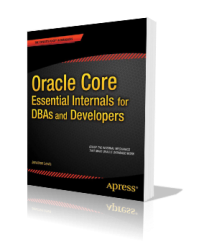Here’s a little example of why you should be very cautious about implementing undocumented discoveries. If you take a look at the view v$sql_hint in 11.2.0.4 you’ll discover a hint (no_)cluster_by_rowid; and if you look in v$parameter you’ll discover two new parameters _optimizer_cluster_by_rowid and _optimizer_cluster_by_rowid_control.
It doesn’t take much imagination to guess that the parameters and hint have something to do with the costs of accessing compressed data by rowid on an Exadata system (see, for example, this posting) and it’s very easy to check what the hint does:
rem
rem Script: cluster_by_rowid.sql
rem Author: Jonathan Lewis
rem Dated: Feb 2014
rem
create table t1
as
select
rownum id,
trunc(dbms_random.value(0,1000)) n1,
trunc(dbms_random.value(0,1000)) n2,
rpad('x',100,'x') padding
from
all_objects
where
rownum <= 10000
;
create index t1_i1 on t1(n1,n2);
-- collect stats
set autotrace on explain
select
/*+
index(t1)
cluster_by_rowid(t1)
*/
id
from
t1
where
n1 = 50
;
I’ve created an index on the two randomly generated columns (n1, n2) and then forced Oracle to walk the index searching for n1 = 50. Because of the presence of n2 in the index the order in which Oracle will visit the rows will be randomised relative to the order in which they are stored in the table – but if I can get Oracle to sort the rowids into order before visiting the table I could (in theory) get a performance benefit from minimising the number of consistent gets I do (some will turn into “buffer is pinned count”), and in the Exadata case I could get a big improvement by ensuring that I decompressed each compression unit no more than once. That’s what the hint does and to prove the point I can select the id column – if the rows are being visited in order of rowid then the output will be in order of id:
ID
----------
198
681
1257
1318
5593
7094
7471
8048
8798
8855
9670
11 rows selected.
---------------------------------------------------------------------
| Id | Operation | Name | Rows | Bytes | Cost |
---------------------------------------------------------------------
| 0 | SELECT STATEMENT | | 10 | 80 | 12 |
| 1 | TABLE ACCESS BY INDEX ROWID| T1 | 10 | 80 | 12 |
| 2 | SORT CLUSTER BY ROWID | | 10 | | 2 |
|* 3 | INDEX RANGE SCAN | T1_I1 | 10 | | 2 |
---------------------------------------------------------------------
Predicate Information (identified by operation id):
---------------------------------------------------
3 - access("N1"=50)
Sure enough – with the hint the data arrives in sorted order, without it the results are not sorted. And, of course, we can check the execution plan and see that the optimizer has inserted a SORT operation between the index range scan and the table access by rowid.
So here’s the fun bit – the parameters are still there in 12.1.0.1 (and _optimizer_cluster_by_rowid is now true by default when it used to be false) but the hint is no longer available [ed: wrong, it’s there but not working – see comment #1]. So if you want the sort to take place, you have to depend (presumably) on the luck of the statistics – when does Oracle think it’s worth doing automatically – or you still have to write the query as a two-part job with an inline, non-mergeable view that accesses and sorts the rowids before visiting the table.
Update
With the arrival of 12.1.0.2 the cluster_by_rowid() hint is once again working.

Hello Jonathan,
Well the hint is there in v$sql_hint in 12.1.0.1 it just does not work. If you check fix control of 11.2.0.4 there is a bug for that:
I think there is a simple explanation to this situation. 12c release date was July 1 2013, and it included all bugs of 11.2.0.4 up to #14843189.
11.2.0.4 was released about half a year later and the number of bugs included into it was higher than fitted into a base 12c release. I think that your test case will start working as expected in the next 12c patch set, when the bug fix 16582322 will re-appear.
Comment by Timur Akhmadeev — May 2, 2014 @ 7:56 pm BST May 2,2014 |
Timur,
Thanks for the comment, sorry about the late reply.
Added to your observation I’ve discovered that my catalogue of 12c hints was actually from the beta, which didn’t have the cluster_by_rowid hint.
Here’s another quirky little detail on hints: in 12.1.0.1 v$sql_hints has ENABLE_PARALLEL_DML as a hint introduced in 11.2.0.4, and CLUSTER_BY_ROWID introduced in 12.1.0.1. But in 11.2.0.4, v$sql_hints doesn’t have ENABLE_PARALLEL_DML at all, and claims CLUSTER_BY_ROWID as introduced in 11.2.0.4.
Comment by Jonathan Lewis — May 12, 2014 @ 7:03 pm BST May 12,2014 |
[…] tablescan path it would have taken if I hadn’t included the hint; finally you might note the cluster_by_rowid() hint in the SQL – there’s no matching “Sort cluster by rowid” operation in […]
Pingback by Delete Costs | Oracle Scratchpad — June 19, 2014 @ 6:19 pm BST Jun 19,2014 |
[…] thinking of when I posed the question was based on a follow-up to some experiments I had done with the cluster_by_rowid() hint. and (there was a little hint in the “several indexes” and more particularly the […]
Pingback by Quiz Night | Oracle Scratchpad — September 10, 2014 @ 12:39 pm BST Sep 10,2014 |
[…] CLUSTER_BY_ROWID […]
Pingback by Oracle SQL | 12c: New SQL PLAN OPERATIONS and HINTS — July 7, 2016 @ 7:53 pm BST Jul 7,2016 |